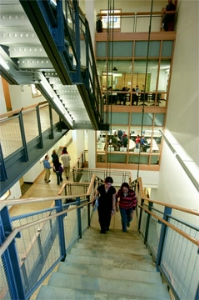Summer Research
* Student(s): Phillip Budiharjo
Advisor: Stephen Festin
Title: Subcloning Alpha-Fetoprotein Analogs in an Escherichia coli Protein Expression System
Abstract:
Previous studies have shown that the C-terminal one-third (200 amino acids) of human alpha-fetoprotein (AFP), known as Domain III (DIII), possesses antiestrotrophic activity useful in preventing the growth of estrogen (E2)-dependent breast cancer cells. DIII, previously expressed as a fusion protein in a baculovirus system, was functionally similar to full-length AFP (Festin, S.M. et al. (1990). Biochimica et Biophysica Acta. 24789, 307.). Further efforts to localize the antiestrotrophic portion of the molecule resulted in a DIII analog, known as DIII AB, which contains the N-terminal two-third (120 amino acids) of DIII. Current attempts represent a novel approach to express DIII and DIII AB in a prokaryotic system. DIII AB cDNA has been subcloned into a pRSET A (Studier, W.S. (1991). Journal of Molecular Biology. 219, 37.) plasmid for expression in E. coli and has been successfully characterized. pRSET A plasmid contains DNA that codes for a protein with an amino terminal histidine tag that aids in the purification step by metal ion affinity chromatography. Characterization of the DIII AB was performed by PCR techniques as well as restriction digest analysis to confirm positive results. Second, we attempted to subclone DIII into pRSET A protein expression system. The cDNA for DIII was isolated from pHAF2 (Tamaoki, T. (1983). Proc. Natl. Acad. Sci. 80, 4604.), obtained from the American Type Culture Collection by PCR amplification using engineered primers containing EcoR1 and BamH1 restriction sites for directional cloning. pHAF 2 was then digested by restriction enzymes, and was ligated to pRSET A plasmids that have also been digested by the same restriction enzymes. Analysis showed that our preliminary attempts were unsuccessful. Ultimately, the goal of the project is to compare the ability of the peptide sequences yielded by DIII and DIII AB to interfere with E2-stimulated growth.
Stipend support for P.B. was provided by the New York Science Education Program (NYSEP).


